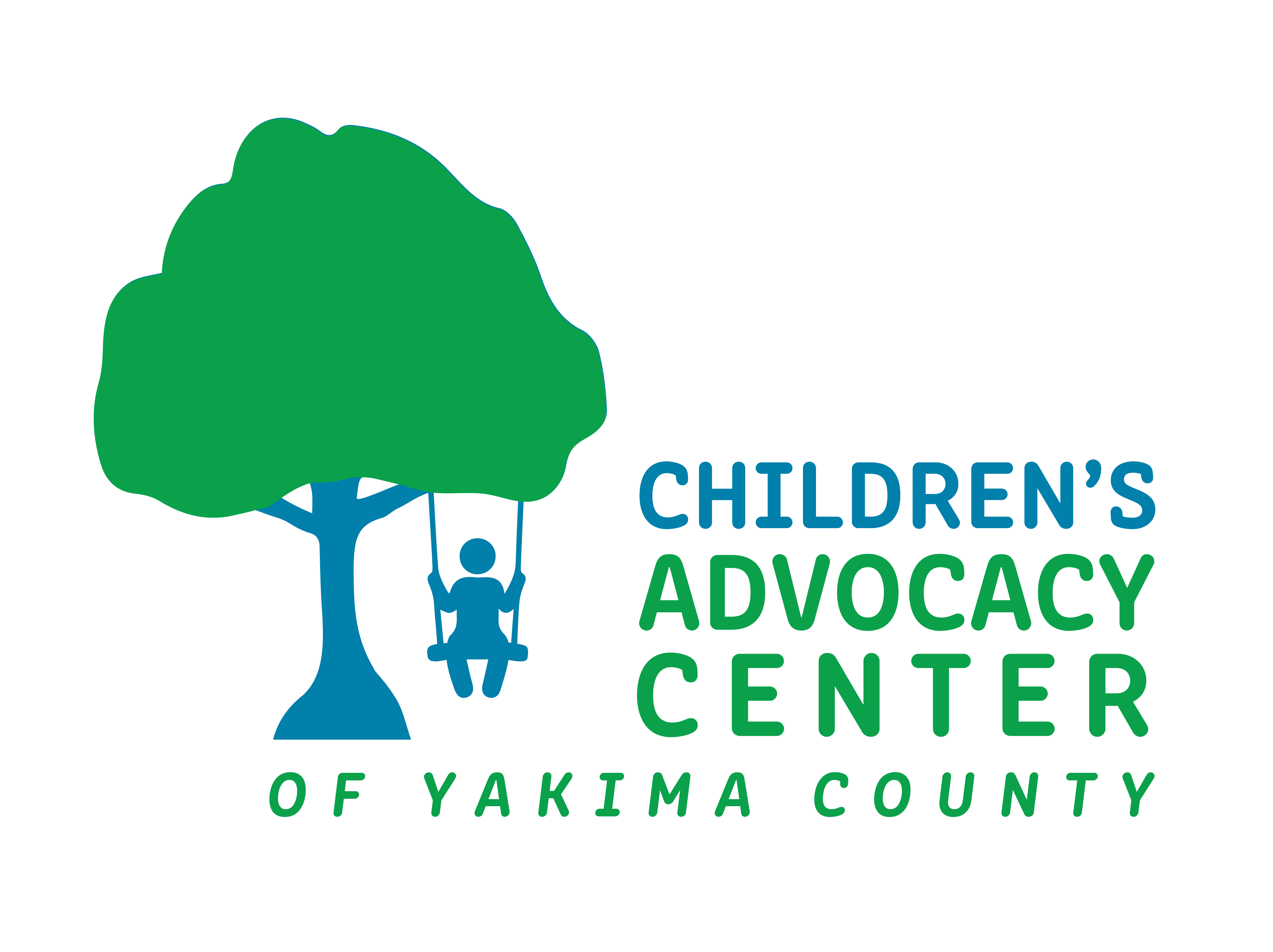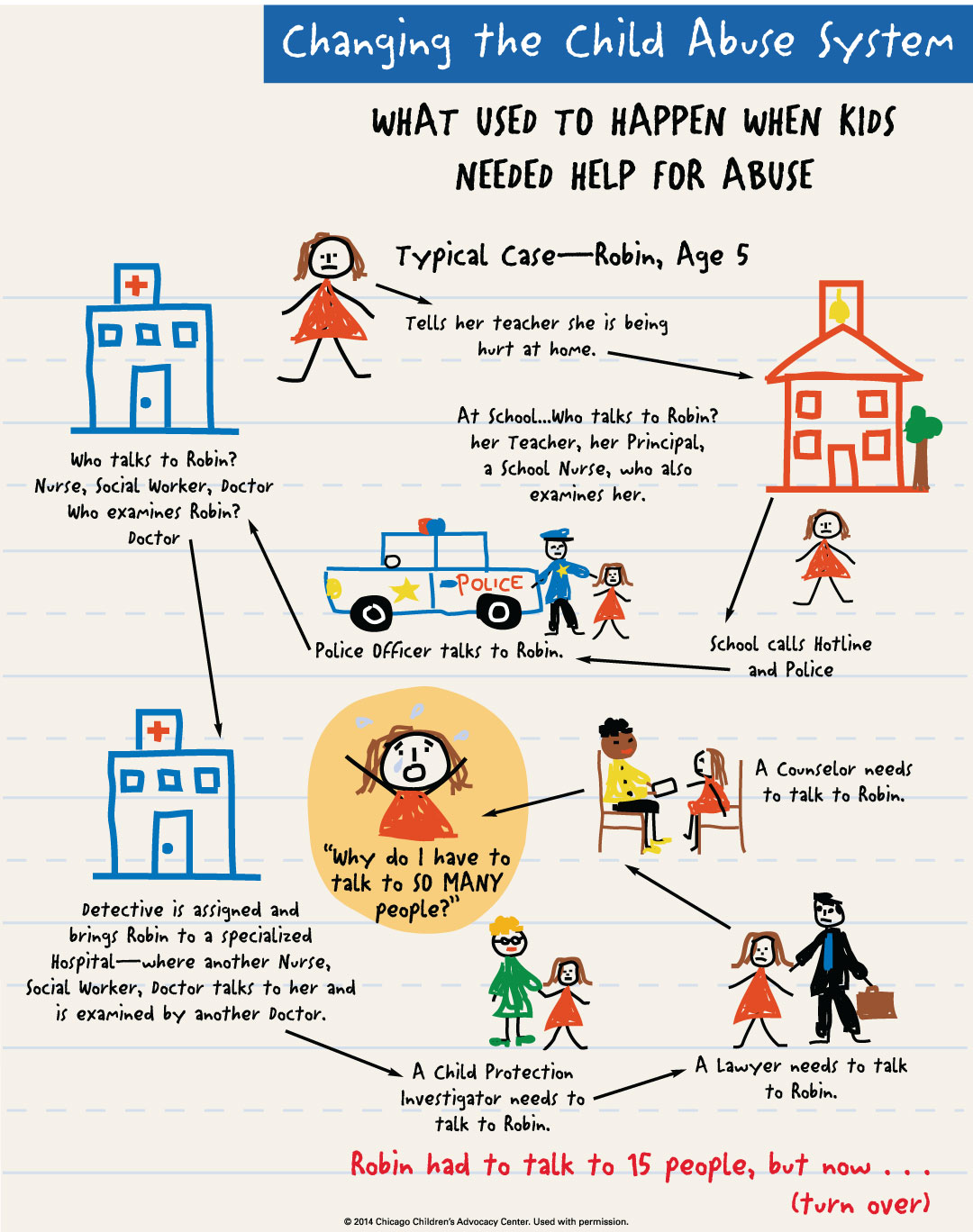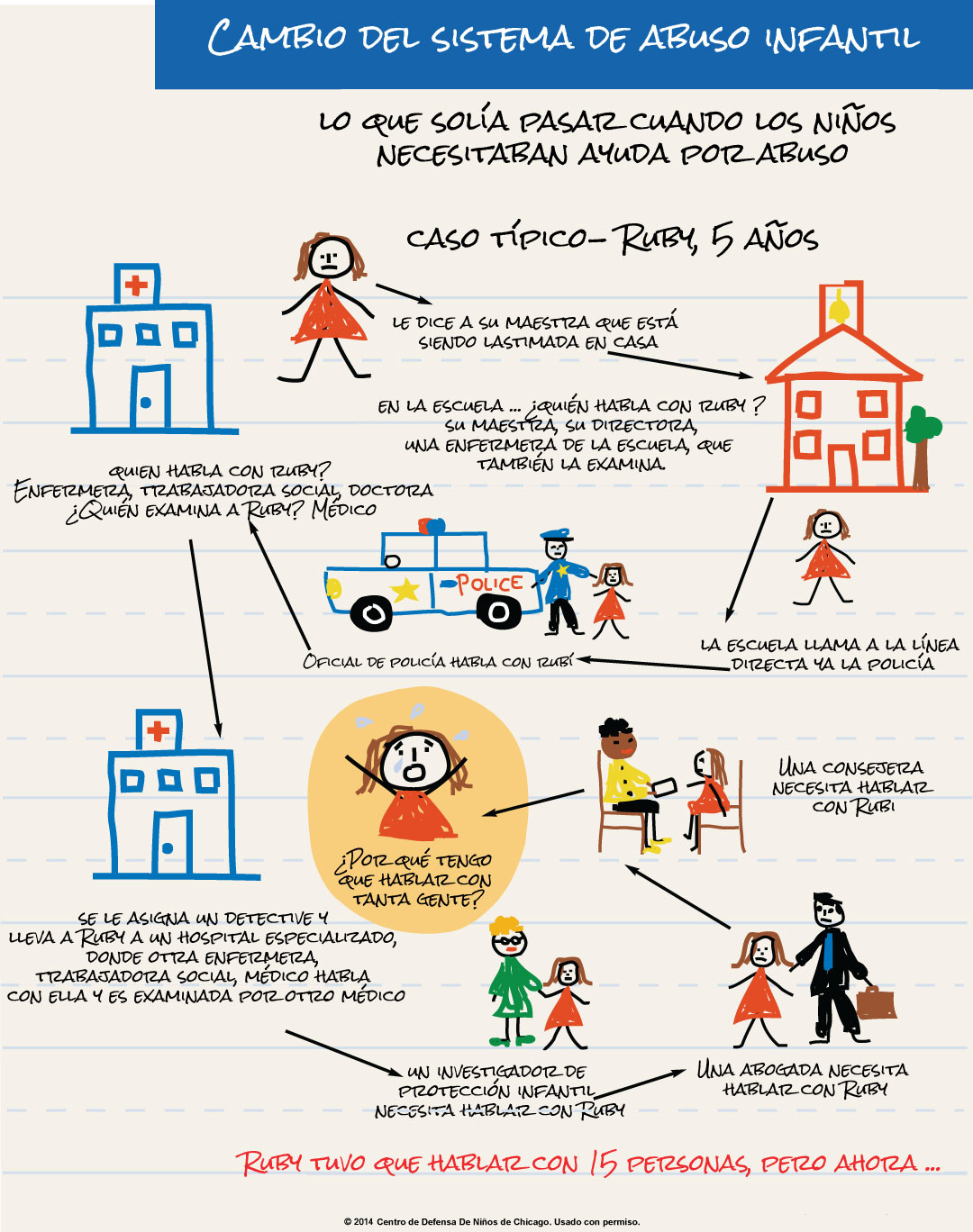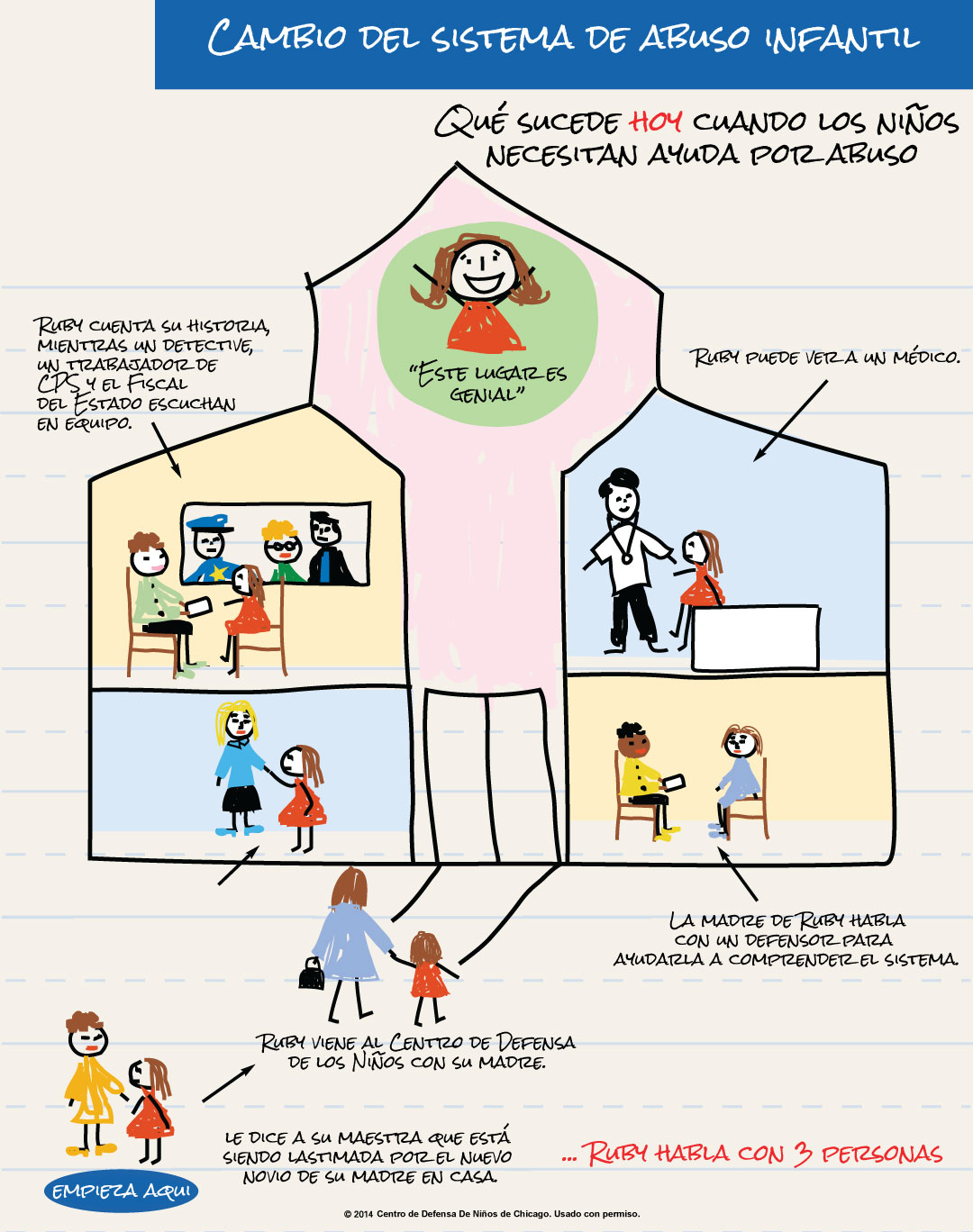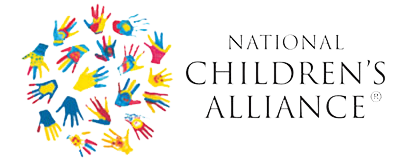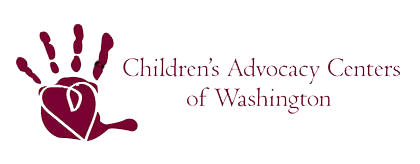About Us
English
Español
What is a CAC?
A Children’s Advocacy Center is a child-focused, facility-based program where representatives from many disciplines meet to discuss and make decisions about investigation, treatment, intervention, and prosecution of child abuse cases. They also work together to prevent further victimization of children.
The multidisciplinary team approach brings together under one umbrella all the professionals and agencies needed to offer comprehensive services: law enforcement, child protective services, prosecution, mental health, medical, and victim advocacy.
CACs are community-based programs designed by professionals and volunteers to meet the unique needs of its community.
Communities that have developed a CAC experience many benefits, including a reduction in the number of child victim interviews and increased successful prosecution. Studies also indicate that communities with a CAC versus communities using the traditional CPS-Law Enforcement response to child abuse saves $1,318 per child abuse case, according to National Children’s Advocacy Center researchers in Huntsville, AL. The study also found that traditional investigations cost 45% more than CAC investigations.
The comprehensive approach, with follow-up services provided by the CAC, ensures that children receive child-focused services in a child-friendly environment — one in which the Child’s needs come first.
Multidisciplinary Team (MDT)
Multidisciplinary Teams (MDT) are the foundation of the Child Advocacy Center’s response to allegations of child abuse. An MDT is a group of professionals from distinct disciplines that collaborate from the point of a report of abuse, throughout a child and family’s involvement with the CAC.
MDT members include: Prosecutors, Law Enforcement Detectives, DCYF Investigators, Forensic Interviewers, Victim Advocates, Medical Professionals, and Mental Health Therapists.
The MDT’s purpose is to reduce the number of times a child has to speak about their abuse, and to help families access safety and services.
The Multi-Disciplinary Team Investigation includes an interview which provides a child the space and time to talk about what happened – in their own words. Team members observe and listen to the interview. Members of the team then work together to create an action plan for support and services based on the needs of the child and family. Our MDTs are dedicated to safety and healing for every child and family.
The Case Specific Multi-Disciplinary Team Includes:
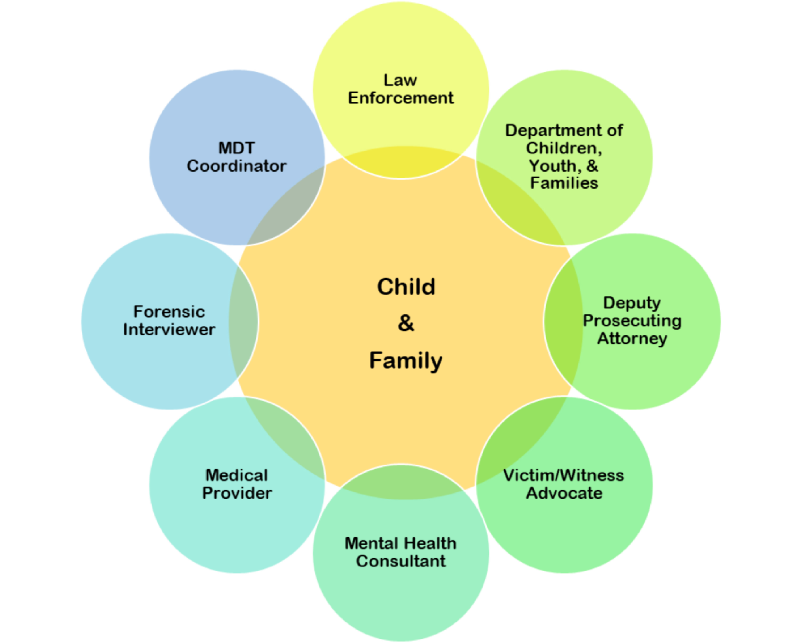
Child & Family
Our Mission:
Through a multidisciplinary team (MDT) coordination of investigation, prosecution, and therapeutic response, the Children’s Advocacy Center of Yakima County strives to reduce the emotional trauma of child victims and witnesses.
MDT Coordinator
Facilitates a coordinated approach in the investigation, treatment, and prosecution of child abuse cases by utilizing a multidisciplinary team of professionals involved in child protective services, law enforcement, prosecution, victim advocacy, medical and mental health services.
Law Enforcement
Responds to reports of child abuse, investigates the allegations in conjunction with DCYF, and makes arrests when appropriate.
DCYF
Responds to reports of child abuse, investigates the allegations in conjunction with law enforcement, and works to ensure children are safe.
Deputy Prosecuting Attorney
Reviews cases with members of Multidisciplinary Team to guide the child abuse investigations, determines whether prosecution in criminal court is appropriate, and prepares cases for trial.
Victim/Witness Advocate
Provides Children and their families/caregivers with support and education about the investigation and criminal justice process, and linkage to community resources.
Mental Health Consultant
Provides evidence-based and trauma focused mental health treatment to children who have experienced abuse or other traumatizing events.
Medical Provider
Provides non-invasive physical exams for children with allegations or concerns of sexual or physical abuse.
Forensic Interviewer
Interviews children who may have experienced abuse, following Washington State Child Interview Guidelines based on the National Institute of Child Health and Human Development (NICHD) investigative interview protocol.
Core Components of a CAC
- Separate, child-friendly facilities for interviewing using a forensic interviewing model and providing services to child victims and the non-offending family members
- Core disciplines:
- law enforcement
- child protective services
- prosecution
- mental health
- medical
- victim advocacy
- Coordinated multidisciplinary investigation team
- Regular interdisciplinary case review
- Intensive case follow-up
Specially trained professionals
The comprehensive approach, with follow-up services provided by the CAC, ensures that children receive child-focused services in a child-friendly environment — one in which the Child’s needs come first.
¿Qué es un Centro de Defensa Infantil?
Un Centro de Defensa Infantil es un programa centrado en el niño y basado en instalaciones donde los representantes de muchas disciplinas se reúnen para discutir y tomar decisiones sobre la investigación, el tratamiento, la intervención y el enjuiciamiento de casos de abuso infantil. También trabajan juntos para evitar una mayor victimización de los niños.
El enfoque de equipo multidisciplinario reúne a todos los profesionales y agencias necesarios para ofrecer servicios integrales: aplicación de la ley, servicios de protección infantil, enjuiciamiento, salud mental, atención médica y defensa de víctimas.
The multidisciplinary team approach brings together under one umbrella all the professionals and agencies needed to offer comprehensive services: law enforcement, child protective services, prosecution, mental health, medical, and victim advocacy.
Los Centros de Defensa Infantil son programas comunitarios diseñados por profesionales y voluntarios para satisfacer las necesidades únicas de su comunidad.
Las comunidades que han desarrollado un Centro de Defensa Infantil experimentan muchos beneficios, incluida una reducción en el número de entrevistas con niños víctimas y un mayor enjuiciamiento exitoso. Los estudios también indican que las comunidades con un Centro de Defensa Infantil versus las comunidades que usan la respuesta tradicional de la policía de Servicios de protección infantil al abuso infantil ahorran $ 1,318 por caso de abuso infantil, según investigadores del Centro Nacional de Defensa de los Niños en Huntsville, AL. El estudio también encontró que las investigaciones tradicionales cuestan un 45% más que las investigaciones de Centros de Defensa Infantil.
El enfoque integral, con servicios de seguimiento proporcionados por el Centro de Defensa Infantil, asegura que los niños reciban servicios centrados en los niños en un entorno amigable para los niños, uno en el que las necesidades del niño son lo primero.
The comprehensive approach, with follow-up services provided by the CAC, ensures that children receive child-focused services in a child-friendly environment — one in which the Child’s needs come first.
Equipo Multidisciplinario (MDT)
Equipos multidisciplinario (MDT) son la base de la respuesta del Centro de Defensa Infantil a las denuncias de abuso infantil. Un Equipo multidisciplinario es un grupo de profesionales de distintas disciplinas que colaboran desde el punto de un informe de abuso, a lo largo de la participación de un niño y su familia con el Centro de Defensa Infantil.
Los miembros del equipo multidisciplinario incluyen: fiscales, detectives de la policía, investigadores del Departamento de ninos, Juventud y Familias, y entrevistadores forenses, defensores de víctimas, profesionales médicos y terapeutas de salud mental.
El propósito del Equipo Multidisciplinario es reducir la cantidad de veces que un niño tiene que hablar sobre su abuso y ayudar a las familias a acceder a servicios y seguridad.
La Investigación del Equipo Multidisciplinario incluye una entrevista que le brinda al niño el espacio y el tiempo para hablar sobre lo que sucedió, en sus propias palabras. Los miembros del equipo observan y escuchan la entrevista. Los miembros del equipo luego trabajan juntos para crear un plan de acción de apoyo y servicios basado en las necesidades del niño y la familia. Nuestros membros del Equipo Multidisciplinario están dedicados a la seguridad y la curación de cada niño y familia.
El Equipo Multidisciplinario específico del caso incluye:
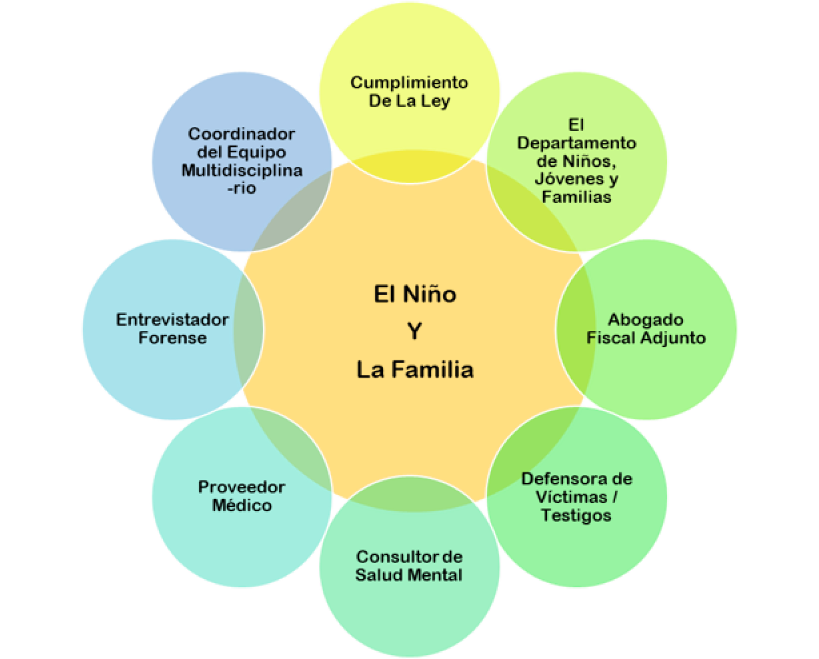
Niña y familia
Nuestra Misión:
A través de un equipo multidisciplinario (MDT) que coordina la investigación, el enjuiciamiento y la respuesta terapéutica, el Centro de Defensa de los Niños del Condado de Yakima se esfuerza por reducir el trauma emocional de los niños víctimas y testigos.
Coordinador del Equipo Multidisciplinario
Facilita un enfoque coordinado en la investigación, el
tratamiento y el enjuiciamiento de casos de abuso infantil mediante la utilización de un equipo
multidisciplinario de profesionales involucrados en los servicios de protección infantil, aplicación de la
ley, procesamiento, defensa de víctimas, servicios médicos y de salud mental.
Aplicación de la Ley
Responde a los informes de abuso infantil, investiga las acusaciones junto con el
Departamento de Niños, Jóvenes y Familias y realiza arrestos cuando corresponde.
Departamento de Niños
Responde a los informes de abuso infantil, investiga las
acusaciones junto con las fuerzas del orden público y trabaja para garantizar que los niños estén
seguros.
Fiscal Adjunto
Revisa los casos con miembros del equipo multidisciplinario para guiar las
investigaciones de abuso infantil, determina si el enjuiciamiento en un tribunal penal es apropiado y
prepara los casos para el juicio.
Defensor de Víctimas / Testigos
Brinda a los niños y sus familias / cuidadores apoyo y educación sobre
la investigación y el proceso de justicia penal, y el vínculo con los recursos comunitarios.
Consultor de Salud Mental
Brinda tratamiento de salud mental basado en evidencia y enfocado en el
trauma de los niños que han sufrido abuso u otros eventos traumatizantes.
Proveedor Médico
Proporciona exámenes físicos, no invasivos para niños con alegaciones o
inquietudes de abuso sexual o físico.
Forensic Interviewer
Entrevista a los niños que pueden haber sufrido abuso, siguiendo las pautas de
entrevista infantil del estado de Washington basadas en el protocolo de entrevista de investigación del
Instituto Nacional de Salud Infantil y Desarrollo Humano (NICHD).
Componentes centrales de un Centro de Defensa Infantil
- Instalaciones separadas y amigables para los niños para entrevistar usando un modelo de entrevista forense y brindando servicios a niños víctimas y familiares no infractores.
- Disciplinas Centrales:
- Cumplimiento de la ley
- Servicios de protección infantil
- Enjuiciamiento
- Servicios de Salud mental
- Médicos
- Defensa de la víctima
- Equipo coordinado de investigación multidisciplinaria.
- Revisión periódica de casos interdisciplinarios.
- Seguimiento intensivo de casos
- Profesionales especialmente capacitados
